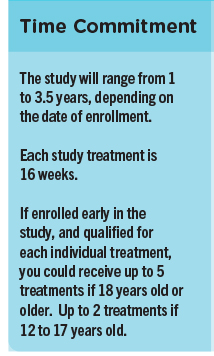What is PrecISE?
The name PrecISE is a shortened, easy-to-remember acronym for the study’s longer full name, the Precision Interventions for Severe and/or Exacerbation-Prone Asthma Network. PrecISE is conducting a clinical study for severe asthma. The study is sponsored by the U.S. National Heart, Lung, and Blood Institute (NHLBI).
The National Institutes of Health's clinical trials database, clinicaltrials.gov, lists PrecISE - see the listing here for more information.
Who makes up the PrecISE network?
PrecISE is a network of universities, medical doctors, and scientists. The entire network is dedicated to discovering ways to treat patients with severe asthma. See more about the team on the About Us page.
How will the PrecISE asthma study work?
First, we will determine if a person is eligible for the study. After a person is found to be eligible and they agree to enroll, they will be asked to record their asthma symptoms and undergo tests to understand their type of severe asthma. We expect most participants to qualify for and receive 2-3 different treatments, depending on their type of severe asthma and when they enroll.
How long is the PrecISE asthma study?
 Participation in the PrecISE asthma study depends on when a person enrolls. If an adult enrolls early in the study, they may qualify and receive all 5 treatments. If so, the adult may be in the study for up to three and a half years. An adolescent (12-17 years) is likely to qualify for fewer treatments. Their participation in the study may be up to two years.
Participation in the PrecISE asthma study depends on when a person enrolls. If an adult enrolls early in the study, they may qualify and receive all 5 treatments. If so, the adult may be in the study for up to three and a half years. An adolescent (12-17 years) is likely to qualify for fewer treatments. Their participation in the study may be up to two years.
Is there a cure for asthma?
Treatment can help asthma, but there is no known cure. Asthma is a chronic disease, so it is long-lasting and won’t go away.
What is severe asthma?
Asthma is severe when it is not well controlled by medicine or requires high doses of medicine to keep it under control. Patients with severe asthma tend to have worsening symptoms over time, with increasing asthma attacks. Symptoms for the person get worse and asthma attacks increase. Severe asthma attacks can be life-threatening. In 2015, 1.7 million visits to ERs in the US were caused by asthma, according to the Centers for Disease Control and Prevention (CDC).
For more information about asthma, visit the NHLBI website.
What is a clinical trial?
Clinical trials are an important step in discovering treatments as well as ways to detect, diagnose, and reduce the risk of disease. Learn more from the National Institutes of Health website.
Why do people participate in clinical trials?
Some people participate in clinical trials for altruistic reasons, in order to research cures and treatments that will relieve suffering of others in the future. Others participate for many different reasons - to receive care or treatment being explored for research purposes that they may not be able to obtain outside the clinical trial, to receive medical care outside the structure of insurance companies, or to receive compensation that many clinical trials provide to participants.
What is NHLBI?
NHLBI is the National Heart, Lung, and Blood Institute (NHLBI). It is the third largest Institute of the National Institutes of Health, located in Bethesda, Maryland, United States. It is tasked with allocating about $3.0 billion in tax revenue per year (fiscal year 2015 estimate) to advancing the understanding of the following issues: development and progression of disease, diagnosis of disease, treatment of disease, disease prevention, reduction of health care disparities within the American population, and advancing the effectiveness of the US medical system.
Note:
The views expressed in these website materials do not necessarily reflect the official policies of the U.S. Department of Health and Human Services, the National Institutes of Health, or its components; nor does the inclusion of trade names/logos/trademarks/or references to outside entities constitute or imply an endorsement by any federal entity.
Where are the PrecISE network centers?
PrecISE network centers are located in many locations across the US. See a map of network centers on the About Us page.

